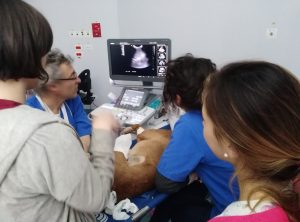Computed tomography attenuation value for the characterization of pleural effusions in dogs: A cross-sectional study in 58 dogs.
Abstract
CT attenuation value can help to differentiate exudate from transudate in people. The aim of this cross-sectional study was to assess the utility of CT in characterizing pleural effusions based on attenuation values in a population of dogs having CT and diagnostic thoracentesis within 48 h of each other. The CT attenuation values were determined using four circular, same size, regions of interest (ROIs) placed on the same CT slice with the greatest quantity of fluid. Values of each ROI were recorded and the mean of the four ROIs mean values (mean of the means) was calculated and considered as the CT attenuation value of that patient. The final population included 23 proper inflammatory exudates, 15 chylous effusions, 12 hemorrhagic effusions and 8 transudates. The median of ‘mean of the means’ values were: exudate 19.22 HU (8.23 to 37.66 HU); chylous effusion 10.26 HU (-0.90 to 15.37); hemorrhagic effusion 31.65 HU (18.10 to 54.97), and transudate 11.20 HU, (-2.52 to 16.59). CT accurately differentiated hemorrhagic from chylous effusion (AUC 1.0, P < 0.0001) and hemorrhagic effusion from transudate (AUC 1.0, P < 0.0001); CT-values allowed good accuracy in distinguishing exudates from transudates [AUC 0.87 (95%, CI: 0.74-1.0; P < 0.0001)]. HU attenuation values did not accurately differentiate between transudates and chylous effusion. A cutoff value of 34.68 HU (sensitivity of 96% and specificity of 95%) discriminated between exudates and hemorrhagic effusions. CT-value <12.15 HU had a sensitivity of 94% and specificity of 78% for identify transudate or chylous effusion.






 Il Direttore Sanitario Dott. Marco Caldin
Il Direttore Sanitario Dott. Marco Caldin